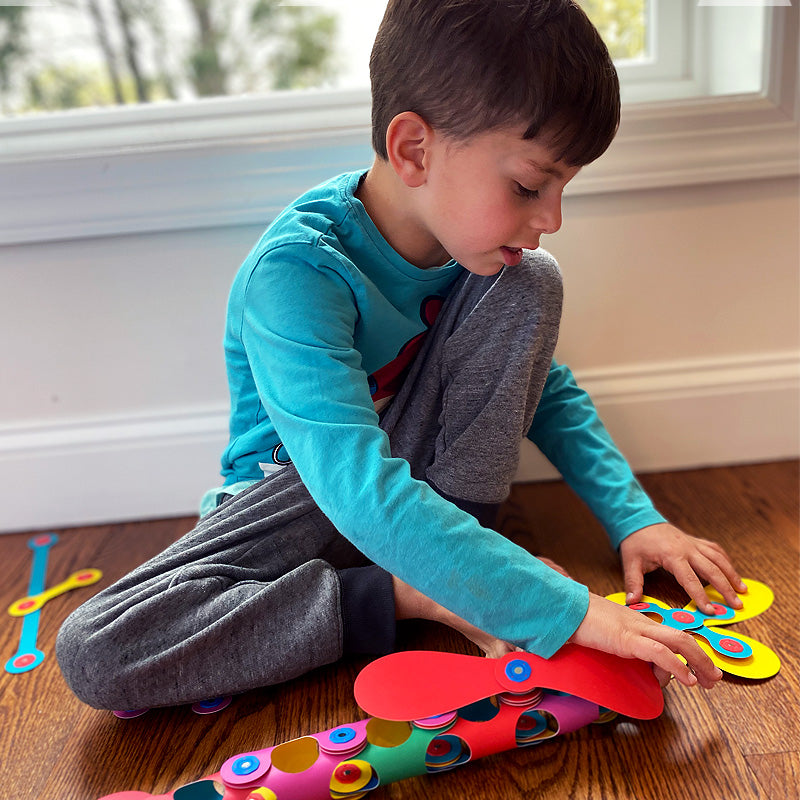Why Playing Alone Can Be Great for Kids
According to research, play is an extremely important part of child development. While playing with other children helps with socialization, kids should also spend time playing alone. Spending time by themselves gives kids the opportunity to take charge and learn to appreciate their own company.
There is a stigma that being alone means you’re automatically lonely. That is simply not true! Solo playtime helps your kids become well-rounded people who are happy being in groups as well as on their own. Not only that, but it gives you a break too! So, let’s look at some of the reasons why playing alone can be great for kids.
Benefits of Playing Alone For Kids

Playing Alone is Great for the Imagination
To start, without other kids around, they have to use their imagination! Playing alone means that they can run wild with ideas and you never know how creative they truly can be until they’re playing alone.
Improves Emotional Regulation
According to research, children who engage in unstructured play have better self-regulation later in life. When kids are playing in a group, they can become overstimulated. If they don’t know how to self-regulate, it can result in outbursts and be highly reactive. This is why temper tantrums happen, and we don’t want that!
Allowing your child to spend time alone will relax their mind. Research from Cornellshows that children ages 3 to 5 need more time for solitary play. They don’t have to worry about others, and allow them to center themselves.
It Teaches Kids Boundaries
Kids can struggle with boundaries, but giving them alone time can help. How many times have you had a fussy kid tugging at you to play? They don’t listen to the word “no” and want you to give in to their demands. Teaching kids how to play by themselves will help them understand boundaries and to occupy themselves instead of insisting on your attention.
Creates Social Independence
It’s so important for children to be able to do things on their own. Even as adults, this is something we can struggle with. This is another reason why children should be encouraged to do their own thing at an early age. If kids learn how to be on their own when they’re young, it will help them in social situations as adults.

They’ll Be More Confident
When kids learn to play on their own, they’re developing problem solving skills. By doing so, they’re going to build confidence in themselves, as well. Solo play makes kids feel like they’re in charge, because they are! They decide everything when they’re playing alone with no other kids to voice an opinion or pass judgment. It’s an excellent exercise in confidence.
Playing Alone Encourages Creativity
When kids are playing alone, they have to come up with the ideas themselves. At first, kids may feel frustrated by this challenge, but it’s good for them in the long run. In fact, after a while kids may grow to prefer playing alone because they get to call the shots.
They Learn to Enjoy Being on Their Own
It’s important for kids to understand that being alone doesn’t always mean being lonely. The ability to enjoy your own company can be one of life’s greatest pleasures. Think about the sigh of relief you let out when you get a few moments alone as a parent. Your kids should appreciate being on their own, too.
How to Encourage Your Kids to Play Alone

Now that we know how great playing alone is for your kids, it’s time to encourage them to try it! The problem is that kids can associate being alone with being a “loser.” There are a few ways to motivate your kids to spend time playing by themselves.
Start By Playing Together
According to PBS, spending 15-20 minutes of playing together will help ease your kid into playing solo. After you’ve played together for a while, let them know you have something you need to do and they’ll have to continue playing on their own. You won’t have to do this every time, but if your child doesn’t seem to be comfortable with playing on their own this may help.
Being Alone Doesn’t Mean Being Lonely
It’s important that you emphasize to them that being alone doesn’t always mean that you’re lonely. In fact, other kids should find it admirable that they’re able to enjoy being on their own! You should also emphasize that just because you’re busy or want them to do something solo doesn’t mean you don’t want to play with them! Stay positive and encouraging.
Support Their Ideas
Young kids can be reliant on their parents to make decisions for them when it comes to playtime. When your kids are telling you their ideas of what they want to do when they’re playing alone, be supportive and encouraging! For example, if you’re busy doing something and you want your kids to go play by themselves, say something positive instead of telling them to go away.
The Bottom Line
To sum it up, solo play is very important for kids. It teaches them skills they’ll need for adulthood to get along with others and help them with their career. If you’re looking for toys to encourage solo playtime, try Clixo’s magnetic building toys. They’re excellent for letting the imagination run wild and creating something all on your own.



